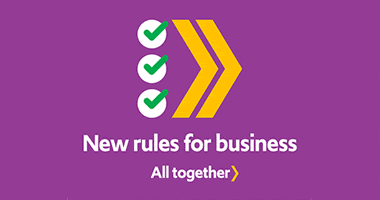New rules now apply to firms involved in moving goods between Great Britain and Northern Ireland. Companies are being encouraged to familiarise themselves with these new actions and the free services that can help them manage the changes.
Firms that are required to trade under the Northern Ireland Protocol should access the free resources available to help them prepare – including by signing up to the Trader Support Service (TSS). One firm that recognised the need for support was Environmental Street Furniture, based in Newtownabbey, Co Antrim. Its managing director, Alan Lowry was one of the first to sign up for the TSS scheme. “We have been actively involved with the TSS from its inception,” says Alan.
“We let them know about all our trading partners in Great Britain and they made contact with them directly to make them aware of what needed to be done. Since the end of the UK Transition period, we have been in contact with them on three occasions regarding EORI, commodity codes and VAT and they have helped us on all occasions. “We have found them to be accessible, helpful and knowledgeable.”
There are additional online resources that firms here can avail of, such as Invest NI’s EU Exit Resilience Tool to assess where firms will need to make changes. Businesses can also access the Brexit checker tool at gov.uk/transition to receive a personalised list of actions to take. Environmental Street Furniture has made good use of these services.
Alan explains: “We have made use of both of these tools and we found the online webinars the best tools to get acquainted with the new requirements and details. “It’s allowed us to ensure all our paperwork and invoices are correctly set up with the new information required for processing and also to register all our commodity codes that were needed for shipping to ensure there were no added delays.” With his experience so far, his advice to other firms is: “Familiarise yourselves with the necessary procedures as best you can.
“Try to use knowledgeable haulage companies and carriers. Ensure your logistics team is aware of what is needed for paperwork and processing.”
KEY ACTIONS FOR YOUR BUSINESS
- Assess your exposure to changes
Use Invest NI’s EU Exit Resilience Tool and access the UK Government’s Brexit checker tool at gov.uk/transition.
- Register for Trader Support Service (TSS)
The TSS provides free training and support for businesses, and can complete declarations on your behalf.
- Get an EORI number If you trade with GB your business needs an EORI number.
- Find out the commodity code for goods you buy or sell
If you buy from or sell to Great Britain, you need to know the commodity codes for these goods.
- Consider if you should register for the UK Trader Scheme
While the UK-EU Free Trade Agreement delivers zero tariffs on imports and exports, there are some instances where duty may be due. The UK Trader Scheme allows you to declare goods you are moving into Northern Ireland are ‘not at risk’ of onward movement to the EU.
- Speak to your haulier
If you move goods to or from GB, ask your haulier what information they need from you.
- Speak to suppliers
Ask what preparation they have made for Brexit and suggest they register for TSS.
- Check your goods regulation
Check whether your goods must meet EU standards. Guidance and support is available from the Movement Assistance Scheme for agri-food products.
- Check if you need to apply for the EU Settlement Scheme
If you or one of your staff is an EEA national (excluding Ireland), you or they will need to apply to the EU Settled Status Scheme.
- Check if you need to apply for an Immigration Sponsorship License
You’ll usually need a sponsor licence to employ someone to work for you from outside the UK (excluding Ireland). This includes unpaid work, like running a charity.

Government Advertising brought to you by the Fermanagh Herald #TogetherWeAreStronger









